
Latest >
- A new breakthrough: a course offered by GCUT was first selected as a national first-class undergraduate one
- GCUT held the 2025 Opening Ceremony for Freshmen
- GCUTers won national first prize in the 18th China Collegiate Computing Contest
- GCUTers won national second and third prizes in the 16th "Lan Qiao Cup" Contest of National Software and Information Technology Talents Final
- GCUT's 2025 Graduation Ceremony: May you keep striving for what you desire
- GCUT held a lecture themed on "effective communications empower one's growth"
- GCUT won 24 provincial awards in the 18th “Challenge Cup” Guangdong Undergraduate Extracurricular Academic Science and Technology Works Competition
- GCUT released 25 digital educational materials to deepen its digital transformation with an aim to set a new benchmark of application-oriented education in the Guangdong-Hong Kong-Macao Greater Bay Area
- GCUT's teachers won awards in the 7th Guangdong Teaching Contest for University (Undergraduate) Young College Teachers
- Shanghai Ranking released its 2025 Best Chinese Non-government Universities Ranking, in which GCUT has ranked the top among Guangdong’s private polytechnic universities for 5 consecutive years
GCUT's teachers won awards in the 7th Guangdong Teaching Contest for University (Undergraduate) Young College Teachers
Time:2025-05-14 Page views:10
The award ceremony and demonstration of related achievements of the 7th Guangdong Teaching Contest for University (Undergraduate) Young College Teachers were held in Sun Yat-sen University on April 23. Teachers from Guangzhou City University of Technology (GCUT) outshone in the contest: Gong Mengying from the International Business School won the first prize, Xiao Xinyu from the School of Civil Engineering won the second prize, Sun Xiangyu from the School of Foreign Languages, and Nie Keshi and Pan Meili from the School of Jewelry won the third prizes. GCUT was awarded the Outstanding Organization Award.
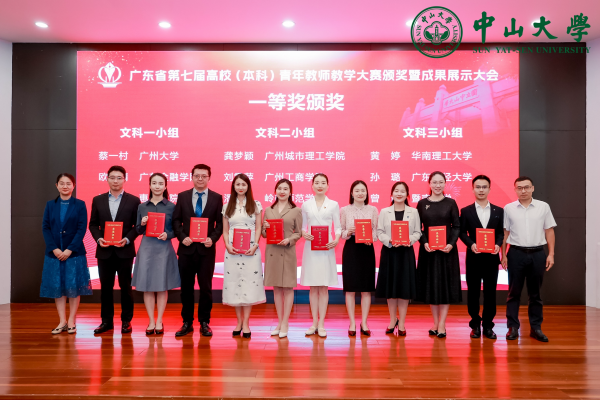
The award ceremony
The fact that teachers from GCUT won several prizes at the contest proves GCUT’s achievements in cultivating young teachers. GCUT has kept improving its cultivation system of teacher training based on its faculty building with teaching contests as an approach to establish a regular preparation mechanism for related contests so as to promote teachers’ teaching reform and innovation. By boosting grassroots teaching organizations through various measures such as strengthening professional ethics of teachers, demonstration-based training and guiding by famous teachers, GCUT provides a platform for the growth and development for young teachers. It carries out different ways of training including artificial intelligence empowering curriculum building and enhancing teachers’ competence for teaching innovation. Moreover, it also organizes its teachers to study in high-level universities such as Peking University, the Hong Kong University of Science and Technology (Guangzhou) and Macau University of Science and Technology while organizing various levels and types of teaching contests.
GCUT will continue to move forward “improving teaching through contests, promoting learning by contests and advancing teaching reforms with contests” in the future to propel the commercialization and application of achievements in such contests. In this way, its teachers can combine what they have learned during the preparation for contests with actual teaching. Furthermore, GCUT will encourage and guide more of its young teachers to focus on improving their professional competence, teaching skills and the abilities to cultivate students’ moral integrity while boosting the growth of young teachers to improve their teaching quality.
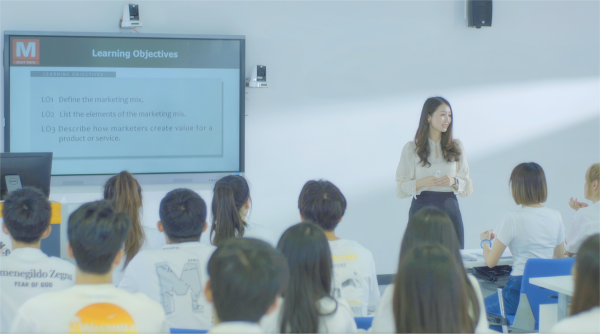
The course, Principles of Marketing
Principles of Marketing is included in the basic curriculum of students majoring in International Economics and Trade of GCUT’s International Business School. Gong Mengying, who is in charge of the course, has also carried out several teaching research and reform projects, which center around students’ growth and development of the major, promoting the innovation of teaching contents and methods.
Focusing on basic principles and applications of marketing, the course integrates interdisciplinary knowledge such as humanities and social sciences and data analysis, paying attention to cultivating students’ marketing insights, innovative spirits and intercultural communication competence. It guides students to focus on fields including digital economy, new retail and sustainable development through diversified teaching methods such as case analysis, practical projects and team work. In this way, it can help them combine what they have learned with the needs of the times, thus improving their comprehensive competitiveness in global business environment.
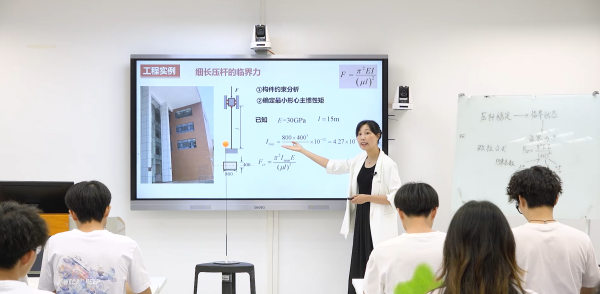
The course, Mechanics of Materials
Mechanics of Materials is a core basic curriculum for students majoring in Civil Engineering, which is taught by Xiao Xinyu. One of its chapter, Stability of Compressed Bar, was approved to be a demonstration curriculum-based ideological and political education for undergraduate students in Guangdong province. With studying the mechanical behavior and laws of materials under different loads as its core, it consists of modules such as four basic deformation forms (including tension and compress, shearing, torsion and bending), combined deformation, stability of compressed bar and theoretical analysis of complex stress. It has formed systematic knowledge structure, which goes through basic theories and engineering practices with its aim to provide theoretical support for engineering structure and component design while cultivating students’ precise thinking of engineering mechanics.
The course puts forward a three integrated system of curriculum-based virtuous and political awareness, namely, “integrating engineering, latest trend and culture” while putting it into practice, which integrates curriculum-based virtuous and political awareness and professional knowledge. Moreover, it combines imparting knowledge, fostering competence and shaping values based on digital and personalized learning featuring knowledge graph with teaching methods innovated. In this way, it empowers students to grow into engineering talents with social responsibility and professional competence in the new era.
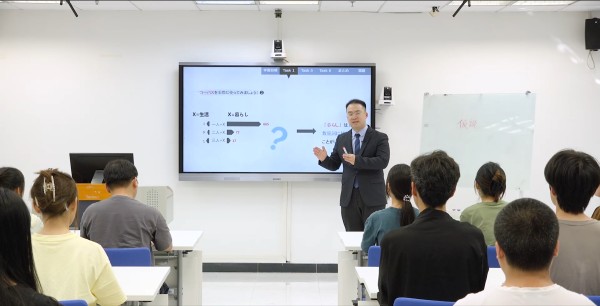
The course, Advanced Japanese
Advanced Japanese is included in the core curriculum for juniors majoring in Japanese. Sun Xiangyu, who is in charge of the course, has participated in two provincial teaching reform projects and hosted one university-level teaching reform project of the course Advanced Japanese. The goal of the course lies on enabling students to master advanced vocabulary, grammar, sentences as well as related expressions and communication skills, thus enriching their knowing of Japan’s society, economy, culture and literature. Consequently, it improves students’ skills of “listening, speaking, writing and translating” comprehensively while fostering their intercultural understanding and intercultural communication competence.
The course concentrates on students’ self-learning abilities, critical thinking and logical thinking through the “four stages of seminar-style teaching” created by Sun Xiangyu. It aims to guide students to foster a correct view on the world, life and values, a sense of national pride and care about their family and country. Meanwhile, it cultivates students’ ability of telling stories about China well in Japanese. Furthermore, they can carry forward fine traditional Chinese culture and make contributions in promoting cultural communication in Japan and even in the world.
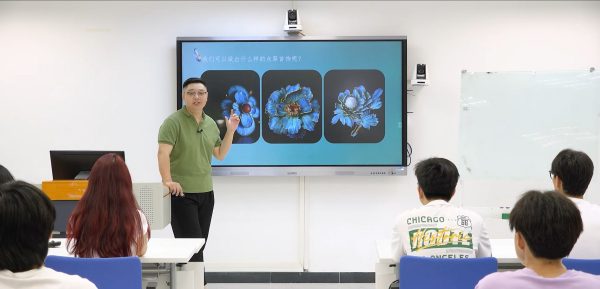
The course, Jewelry Processing and Manufacturing II
Jewelry Processing and Manufacturing II is included in the core curriculum for students majoring in Product Design of GCUT’s School of Jewelry, which is rooted in the major while introducing evaluation standards and requirements of Jewelry Processing Section of WorldSkills Competitions. Through teaching methods such as integrating interdisciplinary majors and displaying experiments for several times during the course, it helps to improve students’ learning efficiency and skills.
The project Teaching Reform of Jewelry Processing Course under the Mode of Skills Competitions based on the course is a university-level quality project. A team for skills competitions was formed based on the project, which is in charge of Nie Keshi. Students can master jewelry manufacturing techniques and design jewelry on their own through learning jewelry craftsmanship. Therefore, they can combine what they have learned with techniques on intangible cultural heritage to carry forward fine traditional Chinese culture while strengthening cultural confidence.
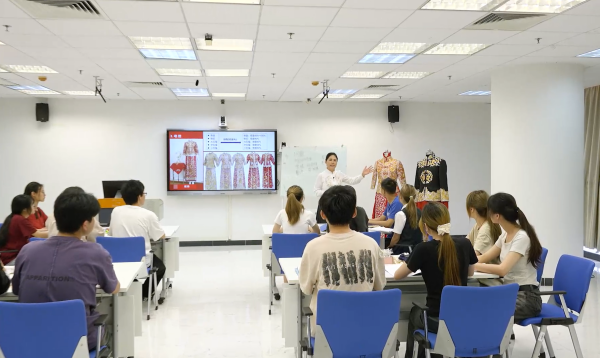
The course, Design of Apparel Fabrics
Design of Apparel Fabrics is acompulsory course for sophomores majoring in Textile and Fashion Design in their first semester, which is rated as a first-class course incubation project that is in charge of Pan Meili. Under the tutelage of Pan Meili, several textile works of her students won prizes in various competitions, including a work entitled The Journey of a Legendary Landscape Painting that won the silver medal in the 4th Wenzhen International Design Biennial, a work entitled Carving Shadows with Flower-shaped Patterns won the Best Production Award in the 19th “Genuine Leather Mark Award” China International Bags and Accessories Design Competition, and a work entitled ZERO-G won the second prize in the first College Students’ Leather Products Innovation and Entrepreneurship Competition of the Guangdong-Hong Kong-Macao Greater Bay Area.
Centering around the requirements of “cultivating innovative and versatile talents” of new liberal arts with competence as its orientation, the course has built a system of integrated goals of “aesthetic competence, knowledge integration and technology integration”. Furthermore, it creates a path to achieve comprehensive curriculum-based virtuous and political awareness featuring “overall five integration” with practice and application as its core, which also provides diversified approaches for students’ practices such as “outstanding projects, innovation and entrepreneurship, and professional contests”. Aiming to foster students’ comprehensive abilities, it has established a comprehensive evaluation standards featured with “six combinations and three key points” to boost students to make a steady progress in taking such course.




